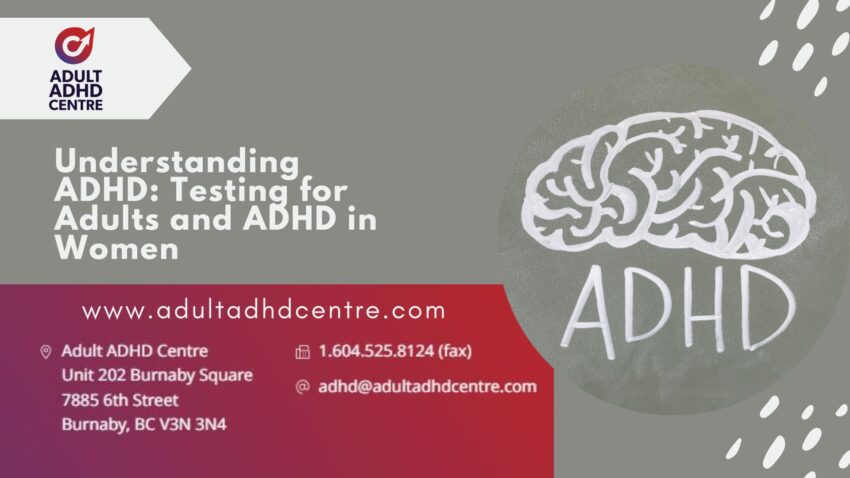ADHD, which stands for Attention Deficit Hyperactivity Disorder, is a neurodevelopmental disorder that affects individuals of all ages. In this informative guide, we’ll explore the crucial aspects of ADHD Testing for Adults and discuss the unique aspects of ADHD in Women.
ADHD Testing for Adults: An Essential Step
ADHD is not limited to childhood; it can persist into adulthood. For adults who suspect they may have ADHD, proper testing is a critical step in understanding and managing the condition.
Understanding Adult ADHD
Adults with ADHD may exhibit symptoms such as inattentiveness, impulsivity, hyperactivity, and difficulty in focusing. These symptoms can have a significant impact on daily life, including work, relationships, and overall well-being.
The Importance of Diagnosis
Getting an accurate diagnosis is the first step towards managing ADHD effectively. Diagnosis typically involves a comprehensive evaluation that may include interviews, questionnaires, and neuropsychological testing.
Self-Assessment Questionnaires
Adults seeking an ADHD diagnosis often complete self-assessment questionnaires. These questionnaires help individuals recognize patterns of behavior and symptoms commonly associated with ADHD.
Neuropsychological Testing
Neuropsychological testing is a comprehensive assessment that explores various cognitive functions, including attention, memory, and executive functioning. These tests provide valuable insights into an individual’s cognitive abilities and any potential ADHD-related challenges.
Psychiatric Evaluation
A psychiatric evaluation by a trained professional is an integral part of the diagnostic process. It helps rule out other conditions with similar symptoms and provides a more accurate diagnosis.
Treatment and Support
Once diagnosed, adults with ADHD can explore various treatment options, including therapy, medication, and lifestyle adjustments. Effective management can significantly improve the quality of life for individuals with adult ADHD.
ADHD in Women: A Unique Perspective
ADHD is often under diagnosed in women due to the differences in symptom presentation and societal expectations. Understanding ADHD’s impact on women is crucial for proper recognition and management.
Diverse Symptom Presentation
ADHD symptoms in women may differ from those in men. Women with ADHD often exhibit more internalized symptoms, such as difficulty with organization, time management, and emotional regulation. These differences can make diagnosis more challenging.
Role of Hormones
Hormonal fluctuations, such as those during the menstrual cycle, pregnancy, and menopause, can exacerbate ADHD symptoms in women. It’s important for healthcare providers to consider these factors when diagnosing and treating women with ADHD.
Coexisting Conditions
ADHD in women is frequently accompanied by coexisting conditions, such as anxiety and depression. These conditions can complicate the diagnostic process and require comprehensive evaluation.
Social Expectations
Societal expectations and gender roles can influence how women cope with ADHD. Many women are adept at masking their symptoms, leading to a delay in diagnosis. Raising awareness of ADHD in women is essential to overcome these barriers.
Support and Empowerment
Empowering women with ADHD involves providing education, support, and resources. With the right tools and strategies, women can effectively manage their symptoms and lead fulfilling lives.
Seeking Help and Support
Recognizing the potential presence of ADHD in adults and understanding the unique challenges faced by women are crucial steps in seeking help and support.
Overcoming Stigma
Seeking help for ADHD should not be stigmatized. It’s essential to understand that ADHD is a neurodevelopment condition, and seeking a diagnosis and support is a proactive step towards improving one’s life.
Professional Evaluation
If you suspect you have ADHD, seeking a professional evaluation is the first step. Trained healthcare providers can assess your symptoms and recommend appropriate interventions.
Treatment Options
ADHD management often involves a combination of therapy, medication, and lifestyle adjustments. Tailored treatment plans are developed based on individual needs.
Supportive Communities
Support groups and communities can provide a sense of belonging and shared experiences. Connecting with others who have ADHD can be both informative and comforting.
Raising Awareness
Raising awareness about ADHD in adults and women is a collective effort. Increased awareness can lead to earlier diagnosis, better support, and reduced stigma surrounding the condition.
Conclusion: Understanding and Managing ADHD
In conclusion, ADHD is a neurodevelopment condition that affects individuals of all ages. Proper diagnosis through ADHD Testing for Adults is crucial for understanding and managing the condition. Additionally, recognizing the unique challenges of ADHD in Women is essential for accurate diagnosis and effective support. By seeking help, raising awareness, and embracing management strategies, individuals with ADHD can lead fulfilling lives


